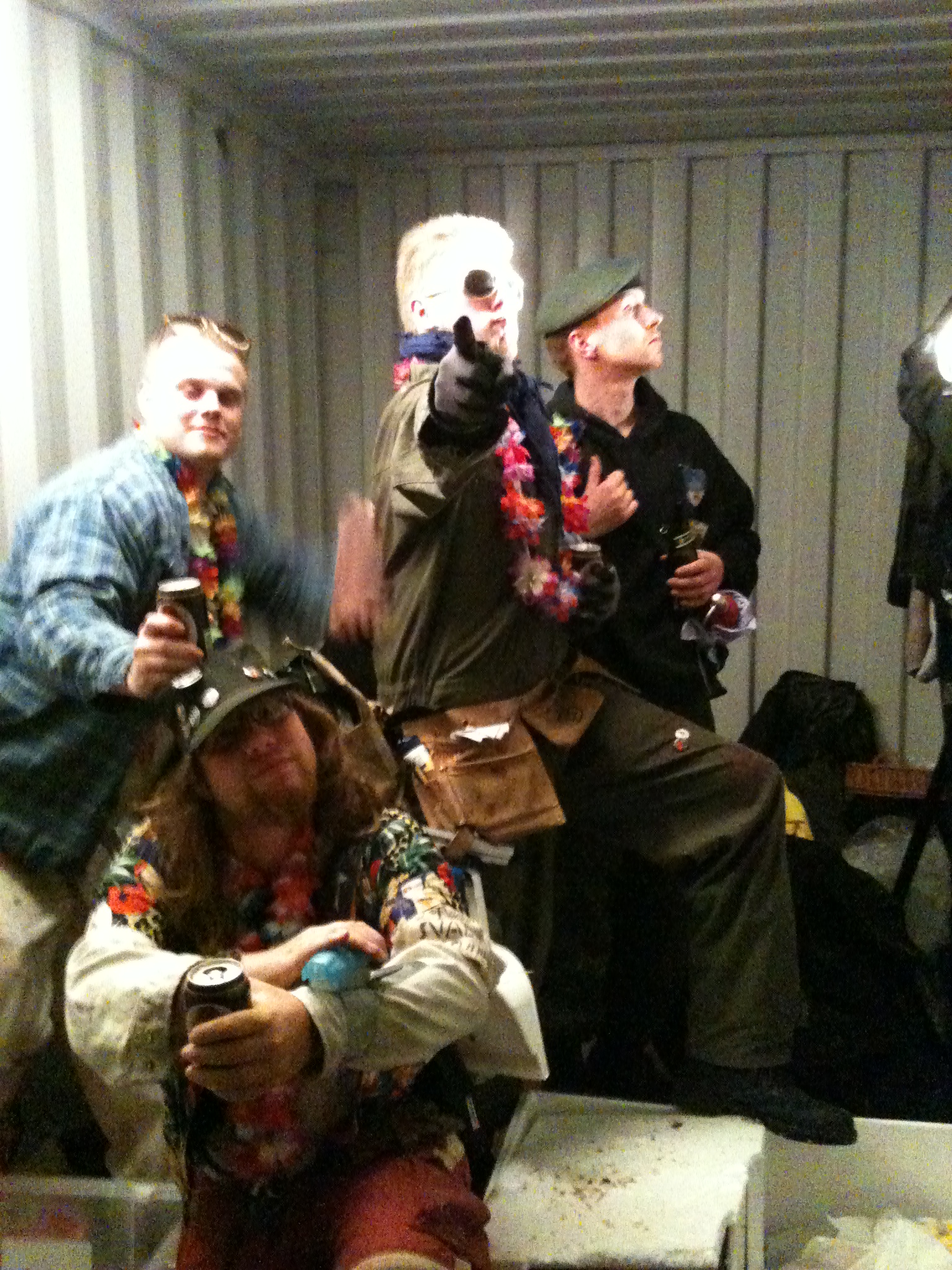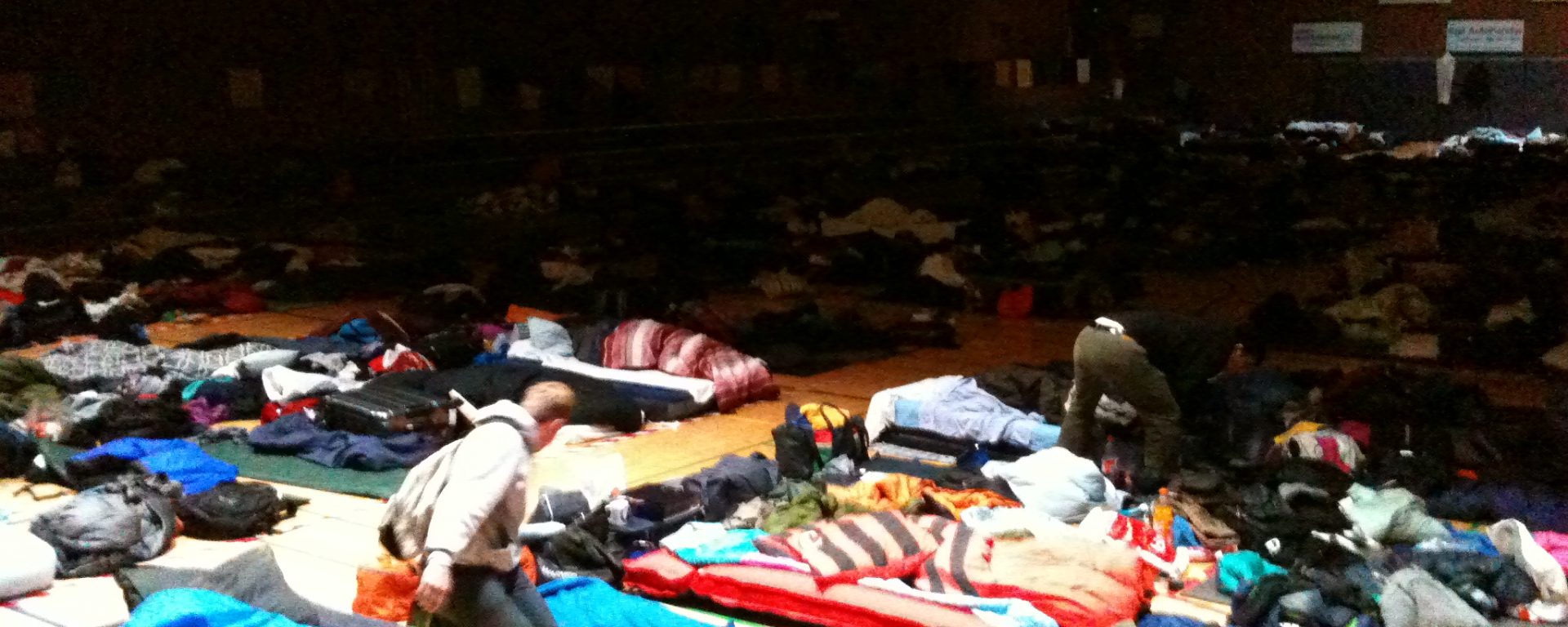This is the third part of a series on Opt-In, Opt-Out Design. These posts are intended to establish a bunch of concepts and basics before going into nitty gritty (case studies and so on). The first part was an introductory video. The second instalment was a text about why the opt-in, opt-out design philosophy is a good practical baseline, especially if your players have limited larp experience.
This third piece is about some of the kinds of things your players will need to know when they are preparing for your game; ideally before signup. Some of this may seem glaringly obvious to you now, but as you shall see in the next instalment on rage quitting, these things are not clear to everyone. I would also like to point out that like most of this blog it is written primarily from a larpwright’s perspective. I’m not asking you to communicate with your players to mollycoddle them: it’s to protect your larp and to save you tons of unnecessary work later.
Just like every computer game teaches its players how to play it, every larp should teach its players how it is meant to be larped, and this includes how to prepare for it and what to expect of the experience in a general sort of way. These are some things you should make sure your participants have understood.
Target Audience, Required Ability and Casting Principles

What kinds of themes will the larp engage with and in what kinds of ways? What kinds of unusual experiences might the participants expect, and what kinds of actions might they need to perform in the larp. For instance, if there is violence in the larp, how it will be modeled. (I will write more about how to communicate this at a later date).
Who is your larp intended for? Do you limit participation based on gender, age, background, language, player experience, height, looks or something else? Are there factors in your larp that exclude some people from participating – for instance, does your larp involve all characters climbing a mountain, or horse-back riding, or a scenography consisting of 800 kg of wheat flour? Must everyone have good hearing? Will there be nudity? Must they be able to read and process a hundred pages of text?
It is good to know that if you are excluding potential players, which of course you will almost always need to do for some reason, people will ask you why. When you provide an answer, they might question this answer in the hopes that you change your mind, or because they feel it is unfair. Not all people will question your choices in a constructive manner (and sometimes they will have solid points, and you might wish to make minor changes in the interest of the greater good; at other times you will be unable or unwilling to make changes, but should still acknowledge valid points as valid).
If your players don’t create their own characters, some level of information about casting is necessary. For instance, what kinds of characters are available; how much one will be able to influence casting; what to do if one is unhappy with the casting; when one can expect to know what one will be playing in the larp and with whom; whether the player’s gender is expected to match their characters’; and whether characters are written as presenting as one of only two genders.
If it is physically impossible for your players to leave the larp in the middle of the larp, they should know this at signup. If there is no cell signal or it is otherwise impossible for their families to stay in touch with them in case of emergency, or for them to discreetly send text messages to their babysitter or whatever, this is also vital information.
And talking about communications, players will assume that even if they have no way to call an ambulance, you will have one (like a satellite phone). If the location involves actual dangers and no help in case of emergency, that should be the first information you share with your players, and you should probably make your players sign something to indicate that they have truly understood the risk. Also, I would urge you to never open that larp for signups, because it seems like a really stupid idea.
Division of Labour
Example: Finnish fantasy larps in the 90s tended to run for a weekend, and the culture was that on Friday night everyone helped set up tents and do other practical tasks. I invited friends who were Vampire larpers to play, and they were livid that I had not told them that they were expected to do physical labour, outdoors, in the middle of the winter.

Your participants don’t automatically know your organisational model or understand your finances. Whatever they pay or otherwise invest will feel expensive for some people and trivial for others, and the expectations for what should in all fairness be included will vary. (This is also pertinent to the point below, Responsibility for Provisions).
Using volunteers is common in many larp cultures and makes a lot of sense in co-creative contexts. The concept of volunteering, however, kind of requires the work to be voluntary, a.k.a, to allow for opting out without fear of social punishment. Your participants may need a rest after their trip before the larp, or have planned to use the time to discuss character relations with other players.
Doing stuff, including physical labour, together out of character is actually an excellent way to create a collective sense of purpose and out-of-character relations between your players. I’m not in any way opposed to requiring it of your participants. But they should know on sign-up that it is expected of them. Otherwise the group will destructively divide into those who enjoy the work or do it as martyrs, and those who opt out either because they are physically unable, or for the very reasonable reason that they did not sign up for this.
Being clear about who does what, and how, is even more vital if you are asking your participants to do in-game labour. Will that work be actual (rather than symbolic)? As in, will real carrying/singing/teaching/serving/digging/studying be happening? What are the in-game and off-game consequences if this work is not performed? To what degree does it limit other kinds of gameplay? (If you want to read more about In-game Labour, there’s an article starting on page 125 in this book).
Division of Game Master Power/ Responsibility for Content
It is of vital importance that your players understand who actually creates the building blocks of your larp: rules and interaction mechanics, world, cultures, plots (as relevant), mods (as relevant), history, institutions, lore, characters, goals, roles, relationships, aesthetics, costumes, run-time direction/game mastering, etc.
You’d be hard pressed to find two larp cultures that divide these responsibilities in an identical fashion between larpmakers and players (and many larp cultures also have in-between functions, such as NPCs, that perform some of them). Unless you are designing exclusively for players with backgrounds identical to yours, you will need to be quite clear about who takes care of what.
This does not have to be conveyed as a meta-level description; you can also demonstrate it through doing it. If there is a world description on your web site at launch, or a sentence saying that the larp is set in an abstracted insane asylum in a contemporary world that does not need to be specified further, your players will know that part is taken care of.
The players also need to know whether their character description as written, and its attached relationships, are a vital part of the game’s design – the interface through which they engage with this machine built out of rules and narrative – or just a fun suggestion to consider a starting point for exploration. If the character has roles or performs functions that are vital for the larp, I would suggest a level of transparency that lets the player know which parts really matter. Just so they know what to prioritise in play – and what they’re expected to not opt out of.
And most importantly, the players need to know how to role-play. What can they invent? Will they bump against the edges of the fiction or the simulation system, and if that happens, what do they do – sort it out amongst themselves, or find an organiser or a referee? (I know this is bizarre to many Americans, for instance, but in my 22 years of larping, I have only once played a larp where non-playing directors or referees were an active presence in the game area during play. Not counting smaller freeform games, some of which would be considered larps in many countries).
Can the players create content and plot? Can they request it? Can they refuse it, if it is suggested by NPC:s, and will they know who the NPC:s are?
Much of this stuff may not seem on the surface if it to be connected to safety or play-style calibration issues, but in fact they often interact with safety on a systemic level. For instance, if a character must be present in specific intense situations for the plot to remain coherent, the player of that character cannot easily choose to opt out of such scenes in the interest of self-care. You can make those design choices, but that choice might then require robust pregame work and aftercare, good calibration mechanics, and a specific casting process.
Division of Responsibility for Provisions, Including Survival and Safety Stuff
Example: My Danish husband ran an international larp in a rented mansion in Denmark. During the larp, a number of players cut their fingers and feet on paper, glass, splinters, etc. The accidents were trivial. The first two who came to him for band-aids got the dusty, wonky ones floating around in his personal toilet bag. Then he ran out, and the third player was utterly outraged that he did not have band-aids at hand – or indeed a first-aid kit at all.

When my husband came home and told me this story, angling for sympathy, I was almost as angry and astonished as his participant: In Sweden and Finland it is pretty much unthinkable to run a larp without bringing at the very least band-aids, painkillers, and tampons. In Denmark, apparently, if you’re a grownup and go away for a few days, you’re in charge of bringing anything you might need. My husband had not thought to share this information with the players, just like he would never specifically remind them to pack their own underwear.
Clearly, the participant’s rage was not about paper-cuts, but about other injuries that could happen, and the care that could then not be provided, unless a first-aid kit was found at the venue.
In other words, the absence of band-aids was to her a symptom of an absence of safety thinking in general, and undermined her trust in the organisers, which could then hamper her ability to play intense scenes with her co-players. In her mind, and mine, the logic sounds something like this: “How can I trust that these calibration mechanics in this intense game have even been tested when the designer has not even brought band-aids?” In the stereotypical Danish organiser mind, the same sentence would go: “How can I trust my players to engage responsibly with my carefully designed interaction system when they are not grown-up enough to bring their own bandaids?”
Both standpoints are valid and logical. It’s just a cultural difference – which in this case happens to be geographical too, but even in the most safety-oriented cultures (like the US) there are enormous subcultures (like people who go to Burning Man) who have entirely different assumptions about how safety and provisions can be organised – at Burning Man, which is in the Nevada desert, everything you do is at your own risk, and you have to bring literally everything you need (including water), except toilets, and take every minuscule scrap of trash you produce with you when you leave.
In many larp cultures, the organisers provide the food, as stated in the game information. In many of the same larp cultures, it is also culturally understood that this food is not sufficient and often of poor quality, and that players should also bring their own. Sometimes dietary needs will be taken into account by organisers; at other times not.
In most countries, organisers of outdoor larps provide sanitation. They don’t always provide toilet paper though, especially not if the toilets are present at the venue (like they would be on rented camp sites, for instance). I followed a very interesting conversation about this on Facebook between an organiser who felt it’s unreasonable to ask organisers to provide hundreds of rolls of toilet paper, and another one who felt that each player carrying their own TP roll was inefficient, a logistical idiocy.
What’s the right answer? You tell me.
I mean, literally, you have to tell me what the right answer is for your larp I’m signing up for.
If you are organising for beginners, people from another larp culture, or just absentminded humans, “What Will I Need To Bring” is a list you have to provide. And please be precise. What does it mean that you will provide “some props” or that player groups are expected to “decorate their area”? With what? To what standard? Are your expectations for what the players can carry with them adjusted for their mode of transport? If this is a larp that requires paying for an extra bag of checked luggage, or arriving in a private car, the players will need to know at signup.
In the next instalment of Basics of Opt-in, Opt-out Design, I will write about rage quitting in larps.
Do you like what you read? Please support this blog on Patreon!
Pictures: At the Danish convention Fastaval, as at many Nordic conventions, the basic sleeping arrangements provided are a rectangle of floor to place your sleeping gear on. At this con, you can also pay extra for a mattress (and there are options further away at hostels, hotels and family accommodation organised at a nearby boarding school). Most importantly, every participant at the convention is supposed to do one shift of “service”, whether game mastering, working the info desk, staffing the kitchen, being a fire guard, or serving breakfast. This is culturally accepted as a way of keeping costs down, building community and creating a sense of ownership for the convention. Cleaning (including cleaning bathrooms) is excluded from the service shifts, and given instead to the Dirtbusters, a pervasive subculture/larp about a kind of paramilitary organisation fighting the forces of chaos through mopping, drinking beer, and listening to Manowar.

I’m really loving this series of articles, especially the little cultural tidbits. The satellite phone mentioned in either this article or the last one was something that occurred to me as a player in another LARP. They’re uncommon among most people in South Australia, but when you have an hour long drive elsewhere it’s lack is a crucial concern. I wasn’t brave enough to ask since I was already there, though it turned out that there were a few very precise spots with reception which were quickly located by random players.